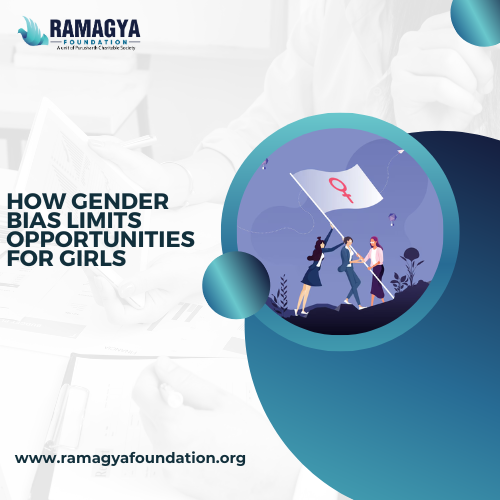A term used to describe gender bias that is used to refer to unfair differences in the way that people are treated according to their gender. It is unfortunate that this type of discrimination affects all aspects of life, not just the opportunities girls have. Knowing how gender bias affects opportunities for girls allows us to solve these issues and move towards a more equitable world.
What is Gender Bias?
Gender bias is when people make judgements or make decisions based on an individual’s gender instead of their skills or abilities. This kind of bias could be observed in a variety of areas, including education, workplaces or even in normal interactions. Girls, for instance, face gender bias typically involving facing obstacles and challenges just because they’re female.
Gender Stereotypes and Their Impact
Stereotypes about gender are preconceived notions regarding what is suitable for girls and boys. These stereotypes could restrict the options available to girls, implying that certain jobs or professions are just for the gender of one. For instance, girls could be urged to pursue career paths in nursing or teaching and boys are directed towards fields such as engineering or science. These stereotypes can create obstacles for girls who want to pursue hobbies that aren’t tied to gender norms.
If girls are being exposed to stereotypes and misconceptions about girls, they could accept them and reduce their aspirations. For example, if the girl is constantly being told that math and science tend to be for boys,she may feel demotivated to pursue the subjects even though she is a passionate student or has talent for these subjects. This self-limiting attitude can drastically impact her chances of success in the future.
Challenges Faced by Women Due to Gender Bias
Gender bias can pose a number of challenges faced by women starting at an early age and extending into adulthood. Here are some of the most significant problems:
- Educational Disparities: Gender prejudices in education could cause fewer opportunities for girls to be successful in fields that are traditionally dominated by men. In some societies girls might not have the same educational opportunities as boys. Even in countries where both genders have equal access to education teachers could unconsciously promote boys to excel in certain subjects, such as sciences and math.
- Career Limitations: Gender bias influences career options and advancement. Women face a lot of obstacles when they attempt to enter male-dominated professions. For instance, fields such as engineering, technology and finance have traditionally been predominantly male, and women working in these fields could encounter additional obstacles including unequal pay or less opportunities for promotion.
- Leadership Opportunities: Females are typically underrepresented in leadership positions in a variety of sectors. In fact, gender bias can influence promotions and hiring decisions which can result in fewer women in the top posts. When women are promoted to positions of leadership, they could face greater scrutiny and greater difficulties than the male equivalents.
- Work-Life Balance: The bias of gender could affect how the concept of work-life balance is perceived and is managed. Women typically face greater pressure to manage the demands of work and family and may be considered more harshly judged in the event that they do not adhere to the norms of society.
How Gender Stereotypes Affect Daily Life
Gender stereotypes aren’t only a factor in the workplace or education system, but they influence daily life too. Girls, for instance, may be pressured to adhere to certain standards of beauty or act in ways that are considered “appropriate” for their gender. This can restrict their individual expression and development.
In sports, gender stereotypes could cause women being denied the opportunity to take part in specific activities. Girls who are interested in playing football or taking part in other sports that are traditionally male-dominated could be put off by the lack of encouragement.
Overcoming Gender Bias and Stereotypes
Distinguishing gender discrimination as well as challenging stereotypical beliefs is vital for creating a more equitable world. Here are some strategies to address these problems:
- Education and Awareness: Teaching people on gender biases and stereotypes can assist in changing behaviors and attitudes. Families, schools and communities must promote gender equality and inspire all children to explore their interests and talents regardless of their gender.
- Encouraging Diverse Role Models: Offering girls diverse roles models from different areas will help to break down stereotypes. If girls see women excelling in fields that are traditionally dominated by men the likelihood is greater for them to believe that they too, can reach similar objectives.
- Supporting Equal Opportunities: Ensuring that girls are equally able to access academic resources, extracurricular activities and opportunities for career advancement is crucial. Schools and other organizations must work to ensure equal opportunities and support for every student, regardless of gender.
- Challenging Stereotypes: Actively challenging and reexamining stereotypes can change the way society operates. Engage in discussions about gender equality, and help support initiatives that encourage inclusive environments.
- Empowering Girls: Encouraging girls to speak out and follow their dreams is vital. By providing them with the tools and confidence needed to overcome barriers and confront stereotypes, they can reach their maximum potential.
Conclusion
The gender bias in the workplace hinders the opportunities of girls, by perpetuating stereotypes and creating barriers to the fields of education, career development as well as everyday life. Understanding the effects of gender bias on girls and how to address these issues is vital to creating an equitable society. By raising awareness, encouraging equality of opportunities and combating stereotypes, we can aid in ensuring that all people regardless of gender are able to achieve and realize their full potential.
Let’s join forces to eliminate gender stereotypes and create a world in which everyone can prosper.
